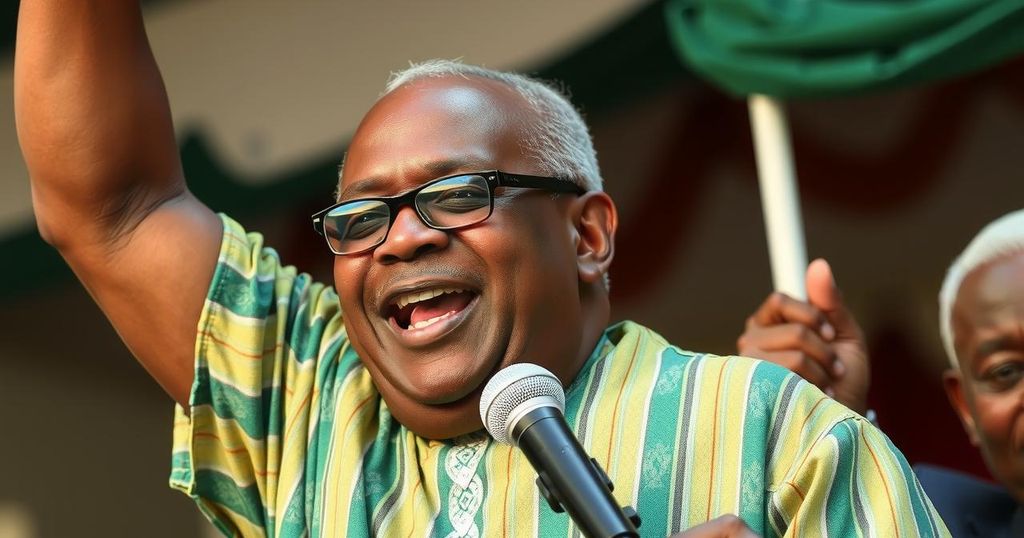John Dramani Mahama has been declared the winner of Ghana’s presidential election, securing 56.5% of the vote amid public anger over economic issues. Vice President Mahamudu Bawumia conceded defeat, and Mahama’s victory is viewed as a response to the incumbent government’s failure to manage the economy. Celebrations broke out among Mahama’s supporters, reflecting a broader trend of opposition party victories globally.
On Monday evening, John Dramani Mahama, Ghana’s former president, was officially declared the winner of the presidential election, which witnessed significant discontent toward the government’s economic management. Mahama, who previously served from 2012 to 2017, garnered 6.3 million votes, representing 56.5% of the total votes, according to the electoral commission. His main challenger, Vice President Mahamudu Bawumia of the New Patriotic Party, conceded defeat after receiving 4.6 million votes or 41%.
Mahama characterized his electoral victory as “emphatic,” stressing his plans to rejuvenate the nation across various sectors during a campaign focused on addressing the economy, particularly aimed at appealing to the youth affected by the ongoing economic crisis. Following the results announcement, celebrations erupted among Mahama’s supporters throughout Ghana, with jubilant crowds showcasing the opposition party’s colors of white, green, red, and black.
This election, which sought to elect both the president and parliament members, took place amidst Ghana’s most severe cost-of-living crisis in a generation, serving as a pivotal moment for democracy in a region often confronted with political instability. West Africa’s regional body, ECOWAS, noted that the election process was largely peaceful, maintaining Ghana’s reputation for democratic norms. Mahama’s National Democratic Congress secured a parliamentary majority alongside his presidential victory.
Analysts have drawn parallels between Mahama’s win and global electoral trends favoring opposition parties against incumbents. Policy analyst Jude Agbemava emphasized Mahama’s potential to revitalize Ghana’s struggling economy, affirming that he stands as “the only person” capable of achieving this. Furthermore, Dr. Seidu Alidu from the University of Legon pointed to the electorate’s discontent with the ruling government, stating that their decision stemmed from pressing issues and a lack of transparent governance amid economic challenges.
The 2024 presidential election in Ghana took place against a backdrop of economic turmoil, characterized by high costs of living and widespread public frustration. Former President John Dramani Mahama has returned to the political forefront after his previous tenure from 2012 to 2017, aiming to address the economic issues that weigh heavily on the population. The election was seen as a significant democratic exercise, especially in a West African region grappling with political unrest and coups. With Vice President Mahamudu Bawumia conceding defeat, the victory for Mahama’s National Democratic Congress represents a shift in power dynamics, reflecting a broader global tendency where incumbent parties are increasingly challenged.
In conclusion, John Dramani Mahama’s victory in the recent presidential elections underscores the critical role economic management plays in voter sentiment. The election outcome, reflecting growing dissatisfaction with the ruling party, highlights a significant shift in Ghana’s political landscape. As opposition parties gain momentum worldwide, Mahama’s promise to improve the economy resonates with many young voters seeking change amid challenging conditions. The peaceful electoral process also reaffirms Ghana’s commitment to democratic principles in a region facing substantial challenges.
Original Source: www.usnews.com






